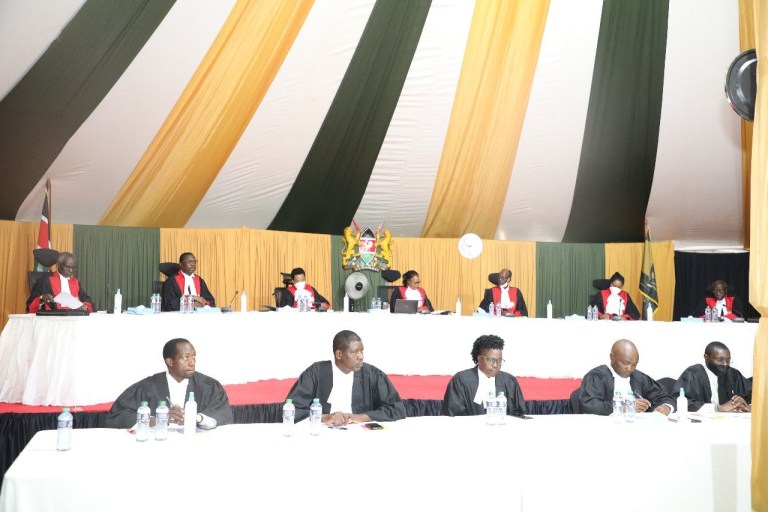The Supreme Court has hammered thefinal nail on the Building Bridges Initiative (BBI) after a majority of the Judges declared the BBI Amendment Bill unconstitutional.
Six out of the seven Judges, CJ Martha Koome, DCJ Philomena Mwilu, Justice Smokin Wanjala, Justice Ibrahim Mohamed, Justice William Ouko and Justice Isaac Lenaola were unanimous that the President can’t initiate constitutional amendments through the popular initiative while Justice Njoki Ndungú dissented.
And on the question whether indeed President Uhuru Kenyatta was the architect of the BBI amendment bill, 5 Judges, CJ Martha Koome, DCJ Philomena Mwilu, Justice Smokin Wanjala, Justice Ibrahim Mohamed and Justice William Ouko were in agreement that the President initiated the BBI process which was an illegality.
Justice Isaac Lenaola and Justice Njoki Ndungú were however of a centrally opinion arguing that President Uhuru Kenyatta wasn’t involved at all.
CJ Koome set the ball rolling saying popular initiative should be a citizen driven and centred process, which should be triggered from below by the citizens and not their elected representatives.
“It’s an avenue for citizens to exercise their sovereign power. Popular initiative is a reserve of the citizens the ones we refer to as wanjiku. I endorse the findings by the two superior Courts that the President ought not to be involved in initiating constitutional amendments through popular initiative,” She said.
Koome further dismissed arguments that the President wasn’t involved saying he took certain stands to endorse the initiative among them signing a communique in March 2018, which was published bearing coat of arms and the Presidential seal, appointing a BBI taskforce as well as receiving the official report in a state function.
“It can’t be disputed that he was involved,” CJ Koome ruled.
DCJ Mwilu was unequivocal in her assessment of the popular initiative saying the President can’t directly initiate amendments to the Constitution and as such declaring the BBI Amendment Bill unconstitutional.
Justice Ouko said the claim that Junet Mohammed and Dennis Waweru were the promoters wasn’t accurate saying the President commenced and spearheaded the process and only handed over the baton when it was too late.
“The President is ineligible to initiate such a process. He can’t act as a citizen while at the same time be the president. The President can’t run with the hare and hunt with the hounds,” he affirmed.
Their sentiments were seconded by Justice Wanjala who said, “It’s on record via a Gazette notice that the President appointed the BBI taskforce, thereafter the he appointed the steering committee and one of the terms of reference were to propose constitutional changes that that culminated with the bill.”
Justice Ibrahim on the other hand ruled that popular initiative should be driven by citizens saying, “We can’t have the president playing the role of umpire in a contest where he is an interested party. The President ceases to be an ordinally citizen the moment he takes oath of office. It’s clear the President was involved from the start.”
And while Justice Lenaola was in agreement that the President can’t initiate constitutional amendments through popular initiative, He was quick to point out that he was not convinced President Uhuru Kenyatta was behind the bill, sentiments echoed by Justice Njoki Ndungú.
Ndungú argued that Popular initiative is about numbers not the promoter saying the Constitution isn’t explicit on who should move an amendment through popular initiative.
“President is elected by the people he can exercise delegated power on their behalf. The President can promote popular amendment through popular initiative, it’s not a preserve of a few people.” She said.
According to Justice Ndung’u, the real initiators of the popular initiative were Dennis Waweru and Junet Mohammed not President Uhuru and Raila Odinga.
A majority of the Judges were unanimous that the second schedule was unconstitutional saying by distributing additional constituencies, it ignored existing scientific criteria, and ignored the principle of public participation.
CJ Koome ruled that by creating constituencies, the BBI bill was usurping the mandate of IEBC saying, “Delimitation of constituencies must be accompanied by a process that is fair and just. They should be allocated by a neutral and independent institution.”
By Fred Odanga Azelwa.
